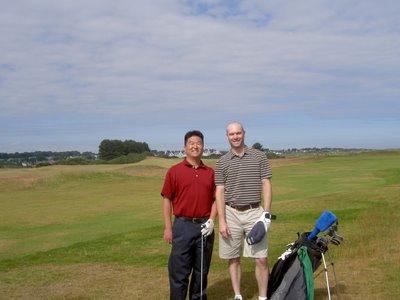Sunday, July 30, 2006
Wharton Way to Wall Street Article...
BusinessWeek article: The Wharton Way to Wall Street
Subscriptions Now Available for This Blog
End game for Term 1
In MGMT 621, Prof Ryan encouraged us to personally reflect on the lessons learned this past weekend. Here's the question: Do I need depth or breadth in my career? This is something I'm thinking about with respect to the next step for me. I think the answer is depth for me.
It was very useful to see GE ex-CEO Jack Welch on video along with the now deposed HP CEO Carly Fiorina. The case studies on People Express and Southwest Airlines were interesting as well. GE certainly seems to take management much more seriously than what I've seen at the big O.
My study group presented The HP Way case study. The prep was a little last minute with all the stuff going on but we did a good job on it. Our presenters delivered the preso well and it seemed to be very well received. It was interesting to analyze the Fiorina era and the Hurd era. The FAP is taking a lot of time for us, and we had some good progress this weekend in our group meetings. It was worthwhile to physically go to our FAP company for two days last week to meet the execs and to see the company culture real-time. There's no substitute for seeing it in person.
ACCT 620 ended with the best lecture we had this term. It was great to take a full set of financial statements from Corbomax and apply what we've learned to slice and dice the case study. Prof Lambert really did a fantastic job with this lecture. I'll never look at a financial statement or press release the same again, that's for sure. In talking with some classmates afterwards, everyone agreed that this last lecture was a great one. We used pretty much everything we learned the entire term in this one case.
MGEC lectures are already finished up so we didn't have a lecture this session. I wish the schedule was a bit more forgiving as we had to absorb the class faster than usual; it ended last session, one month before finals. That's the nature of the program though. Prof Smetters taught a very entertaining class...he's a funny guy and I think a lot of us like his sense of humor. The course material is engaging as well; the problems are interesting and applicable. We did have a useful MGEC review this session from 8-10pm. Our TA Karl really cracked me up. It was late (8-10pm) and we were punchy. I'm sure he was as well, as it was 11pm-1am EST.
Here's what he said:
"In the business world, accidently doing the right thing is fine. On the exam, accidently doing the right thing won't be fine."
That said, for now I'm off to study MGEC and accounting and work on the FAP! Out until the end of the term....
Scottish Golf Pilgrimage

Props out to the Grand Cru team for letting me skip out on conference calls while I wuz golfing!
 Teeing off at the Royal Troon Old Course, where they hosted the
Teeing off at the Royal Troon Old Course, where they hosted the2004 The Open Championship. In the US, we call it the British Open.
It was a fantastic trip, and I can't wait to head back to Scotland someday. The golf was the best trip I've ever had! But let's just say that I didn't get a whole lot of studying done....
Advice to future students: take your vacations *before* Wharton starts, not during!
 Wharton Class 32 students are everywhere! I saw one of my Class 32 classmates, Charles, while on the course at Carnoustie and in my hotel at St Andrews...
Wharton Class 32 students are everywhere! I saw one of my Class 32 classmates, Charles, while on the course at Carnoustie and in my hotel at St Andrews...Wednesday, July 19, 2006
2006 Financial Times Rankings

Wharton rated #1 in FT in 2006 and 2005
The Wharton school at the University of Pennsylvania, ranked number one in the Financial Times ranking again this year, also takes the purist route, with all its courses in Philadelphia and San Francisco taught by Wharton folk. Like Prof Snyder, Howard Kaufold, director of Wharton’s MBA for Executives, believes it is a question of quality, and believes there is confusion in the marketplace about the content on many EMBA programmes. “There’s a general relaxation of standards. It’s a battle we are constantly fighting.”
Wharton again rated #1 in FT for salaries after graduation
The Wharton school at the University of Pennsylvania has topped the ranking for the fifth year in a row. Its students earn the highest salaries three years after graduation ($229,728). However, in common with many of the top EMBA programmes, specially in the US, the Wharton course fees are well in excess of $100,000.
Drinking from a fire hose
My hair is burning off because we are going so fast! I don't know about everyone else, but I feel as if we have been drinking from a fire hose for Term 1. We have had a mid-term, case study presentation or paper due every session since Week 2. The sheer amount of material is massive. And it will only increase as we head towards finals.
What makes it challenging is limited time to study, with having a family and a full-time job and being a full-time student. As some of you know, I'm now planning on transitioning from my "Horizon 1" job in the next few months to something more "Horizon 3". Sounds like there's a lot of us that are contemplating the Next Step after Wharton already. From what I hear from Class 31, a lot of students go through job changes in the first year.
It's been great to have such a high caliber set of people in our class. I like all of the classes so far, and the material / teaching has been solid.
My vacation has been wonderful so far. Golf in Scotland is the best! I saw Charles at the Scores Hotel in St Andrews and on the course at Carnoustie, site of the 1999 British Open. Not a whole lot of WEMBA is getting done here. I did lug some MGEC stuff here just so I wouldn't feel too guilty.
Advice to next year's class: don't take an international trip in the middle of Term 1! Go on vacation before WEMBA starts.
Chairman P
Friday, July 14, 2006
Prof Ryan at the ballgame

Professor Ryan joins the WEMBA students at the Giants-Phillies game. Joe teaches Management of People and Organizations, a first term core class.
WEMBA group at the Giants game

WEMBA students enjoying the Giants-Phillies ballgame at Pac Bell Park.
The Old Ship Saloon - Unwinding Time
 Wharton is no picnic, and sometimes we head out after class for a few drinks together to wind down after some really long days in class. It's a great chance to get to know everyone on a personal basis!
Wharton is no picnic, and sometimes we head out after class for a few drinks together to wind down after some really long days in class. It's a great chance to get to know everyone on a personal basis!
Thursday, July 13, 2006
Inside Wharton West - Folger Building

The building at 101 Howard is recently renovated and state of the art. Here's the view before you head up the elevators to the 4th and 5th floors.
Sunday, July 09, 2006
Getting Admitted to the Wharton MBA Program for Executives
I first started thinking about getting an Executive MBA in the summer of 2006. I had always wanted to go back to school after my undergraduate studies for an MBA, but the Silicon Valley internet boom made it too compelling to stay at work. The ROI just wasn't there to go back to school full-time, and I had gotten married and had a child. And my career was in full swing as a director in large public software company. And then I got the crazy idea to go back to school full time. But the more I thought about it the more I decided that it was right for me. And if I did it, I wanted to do it at the best school I could, otherwise it wouldn't be worth the time. I didn't want an "MBA-lite". Otherwise I'd just order one off the internet somewhere.
Then, I realized there was this thing called The GMAT. "Wow,", I mused. "I never thought I'd never take a standardized test again!" I found out that standardized tests have CHANGED, too. They are now electronic, and you have to go to a testing center and take it on a computer. They are also adaptive, which means that they start medium dificulty and then get harder if you answer the questions right. Or easier if you don't, which causes you to stress out when you see an easy question! Of course, there are experimental questions, which could be the case that you are getting an easy question. You never know though.
So I enrolled in Kaplan's review course, which was expensive enough for me to take seriously and put skin in the game. I studied pretty hard in the fall and managed to increase my original diagnostic test score +100 points into the 700s. And I figured that was good enough to get me in whereever I applied due to my work experience. I took the real test in November. I got the typical engineer's high quant score and pretty mediocre verbal score.
Applications were next, which was around the Dec 2005 until Feb 2006. I applied to the Wharton MBA Program for Executives, which was ranked #1 for EMBA programs in 2005, as well as Berkeley-Columbia and UCLA's executive MBA programs. Boy, they were a lot of work. Most of the work was in the essays. I'd say that I spent about 40 hours per application. It was good because they really make you focus on what you want and why you are applying to the programs. Some of them have word limits, so you really have to concise with what you are trying to say.
From March 2006 until April 2006, I found out that I had been admitted to Wharton, Berkeley-Columbia, and UCLA. So I had my pick of the litter. After visiting, researching, and taking some time, I chose Wharton. It was ranked #1 in Financial Times, I perceived that the caliber of students was highest, and it was closest in proximity to my house. I liked the Ivy League pedigree and opportunity, which I felt would be a great experience to contrast with my University of California experience. UCLA and Berkeley would have been too similar to my undergrad experience. Plus UCLA would require flying every other week, and Berkley's program suffered from not even being on the ranking list. Their admissions office was also not the most responsive. The downside to Wharton was it didn't have a real campus here in San Francisco, it had the rep of being unnecessarily competitive, and it was the most expensive program. Being mostly self-funded, the price tag was the big question. Was it really worth $50K more than the cheapest program (UCLA)? After doing the analysis, I decided that it was. FT's average ranking of EMBA grads was that their salaries had increased an average of 60% three years after graduation. If that number was even close, then the incremental cost would be insignificant. I had the rest of my working life to recoup the investment, and I determined that the program would pay for itself in five years if the numbers were right.
And so I enrolled in the Wharton program and started in May 2006. This is my story...
The Exec MBA Journey
Read on!
RP









